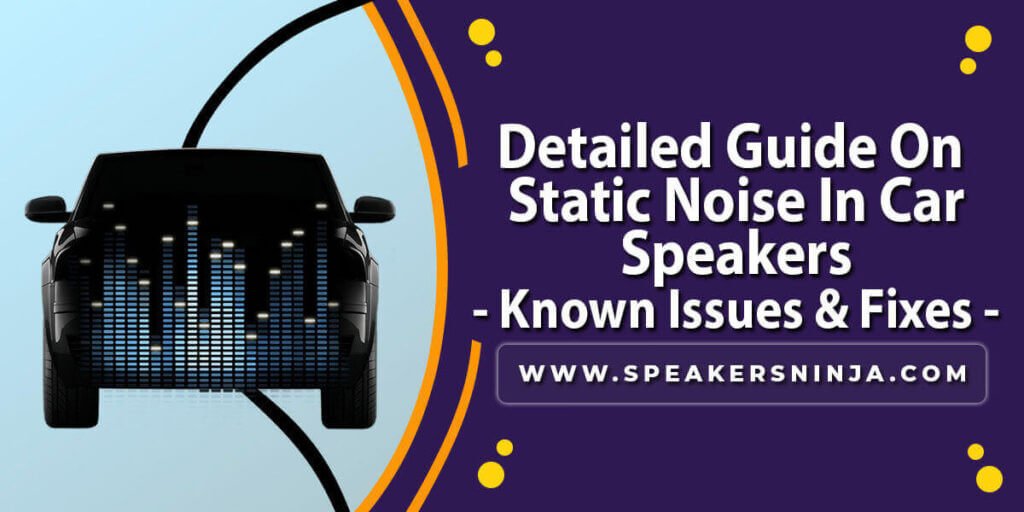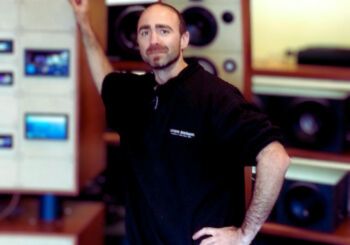
There is no doubt that having excellent car speakers or a speaker system is one of the best ways to ensure that your audio experience in your car is the best it can possibly be. This is because your speakers are not just an endpoint or an output-producing device instead, they have certain complex and technical factors about them that make them this great. Since most of us usually do not have the right kind of technical know-how, we can, therefore, be very confused when issues like static noise in-car speakers arise.
In case you are not clear on what this constitutes, it is that excruciatingly annoying pitchy, and crinkly noise that comes out of your speakers sometimes. It can instantly ruin your mood and your favorite tunes, and let’s face it; no one wants to go to work with that being the first thing they hear in the morning.
So this is why we are going to take a deeper look into first what this static noise in-car speakers problem is? and how it originates in your speakers, and second, how to fix it!
- How To Fix Static Noise In Car Speakers?
- One Of The Main Reasons Can Be Too Much Power Being Sent To The Speakers.
- Another Problem Might Be That Your Amplifier Is Outdated.
- Now For The Most Commonly Reoccurring Problem Which Is Damaged Speakers.
- Lastly, The Biggest And Most Easily Solved Issue Is That Of Loose Wires.
- Find Out What Element Is The Cause Of The Static Noise From Your Car Speaker.
- Next, Take A Look At The Patch Cables And See If The Links Can Be Fixed.
- Another Way To Resolve The Issue Is To Disconnect The Speaker Wires From The Amplifiers
- Lastly, You Could Opt For The Addition Of A Noise Filter.
How To Fix Static Noise In Car Speakers?
Let us take a closer look at what causes static noise in car speakers and how we can solve those issues without having to make a mess.
One Of The Main Reasons Can Be Too Much Power Being Sent To The Speakers.
Despite the fact that people believe that the more amount of power you get, you subsequently ensure that you get the clearest and crispest, on the contrary, an overabundance of said power might end up making loads of distortion in the music.
You should keep in mind that simply relying on the speakers or amplifiers can’t control the intensity of the power. Along these lines, when you hear any distortion or static in the sound, you should view both the electricity source just as much as you look at the speaker’s capacity.
However, sometimes audio that you have recorded yourself might not of perfect quality due to restraints and thus you may end up with as much distortion.
One of the easiest and fool-proof solutions here is to simply turn the volume down on your car speaker, and while this will not solve your problem in the longer run, it definitely is an excellent way to cut down on any possible distortion.
Related Read : How To Stop Car Speakers From Buzzing?
Another Problem Might Be That Your Amplifier Is Outdated.
At times an old amplifier produces horrible sounds such as crackling that is most commonly associated with static and this is even more worrisome as you have purchased the device to aid your speakers and you expect such transistors and capacitors to last you a long time.
Now one of the biggest issues with a device like an amplifier is that the connection by which the attachments hold the transistors and capacitors together might have gone loose. If they’ve gone lose you don’t need to chuck the entire speaker set out but simply get them reattached by a professional.
However if they have become corroded due to chemical leakage, then there might not be any possibility of saving it. Finally, because you are tweaking the bass setting when you use an amplifier, keep in mind that sometimes the distortion in your favorite song might not be due to a problem but merely a side effect of excessive vibrations produced by you listening to music at the highest setting. Try turning the volume down slightly and see the difference.
Now For The Most Commonly Reoccurring Problem Which Is Damaged Speakers.

Of course, this is the first thought that comes to any user’s mind when they hear static but we mentioned it later because it isn’t a hopeless situation. Statistically speaking, it is one of the most common problems because around 95 % of issues of static sound originates from speakers that are damaged. This is because if your cone is harmed it will deliver a ton of vibration which can produce a ton of static and additional noise distortion.
In some cases, your speaker might become loose or torn free from the main body which means that all the components won’t be able to vibrate properly. Another reason here that can make matters worse is that something might be touching the speaker when the sound is being produced, which also stops the sound vibrations from being produced adequately.
This is because even the single particles of the speaker assume a crucial job for efficient sound streaming. On the off chance that anything doesn’t function in the right way, the sound quality won’t be sufficient. This is why the first task must always be looking at the speakers in more detail before you look ahead to other issues.
Read Also: Here are the steps I took to repair my blown subwoofer.
Lastly, The Biggest And Most Easily Solved Issue Is That Of Loose Wires.
Wires are the main segment of your speaker system that conveys the sound just as the pressure or power from an outer source to the speakers. However, this does not mean that you cannot have wireless connectivity even though these are more expensive as compared to other kinds. So if you cannot afford a more expensive option then it is best to opt for wires. These can be reattached by a professional.
Now, Let’s Move On To Some Of The Ways You Can Fix These Problems With Static.
Find Out What Element Is The Cause Of The Static Noise From Your Car Speaker.
The initial step to taking care of the issue is by distinguishing the real reason behind the obvious problem at hand. Evidently, there are different reasons that can cause the static including signal degradation as a result of RF interference, for the most part, because of unshielded antenna cable or because there is a wire near the antenna apparatus which is responsible for putting out electromagnetic(EM) impedance.
While there is no doubt that many times, the issue might be with the radio or the car’s built-in CD player. Mostly the issue is with the speakers themselves. So one must be completely diligent in order to discover the issue as you may have to initially start the head unit and afterward set it so you can hear the static noise in order to pinpoint the exact location.
Next, Take A Look At The Patch Cables And See If The Links Can Be Fixed.
RCA patch links associated with the car’s sound system are equipped for picking static commotion. If you wish to test this all you have to do is simply taking off the links from your amplifier. At that point, embed either side of the extra patch cable into the left and right information jacks of your amp. Then, you have to turn on both the motor and the audio framework. If the noise suddenly vanishes, reconnect the links to the amp and separate it from the receiver.
If despite everything, you still hear the distortion, at that point, it is your patch cables that are getting the static commotion. To fix this, attempt the simple re-routing of your cables and separate them from the main power cable by around 18 inches. If the issue persists, you may need to change the brand of patches you are attaching.
Alternatively, if even after all of that, you still feel as if the commotion isn’t beginning from the patch cables and still persists after all your tweaking, then at that point likely it is getting through the antenna.
Another Way To Resolve The Issue Is To Disconnect The Speaker Wires From The Amplifiers
Much of the time, static distortion gets through the speaker wires. To test the wires, turn off the framework and disengage the speaker wires from the amplifiers. That is precisely when you should start your vehicle. On the off chance that the distortion doesn’t go away despite all your efforts, at that point it is likely it’s being transmitted into the wires.
At that point, re-position the wires or shield them utilizing specialized kinds of foil wrapping. Additionally, check to guarantee that the speaker wires are appropriately fixed and there are no breaks in the wireline.
Lastly, You Could Opt For The Addition Of A Noise Filter.
On the off chance that the issue is identified with a certain kind of noise in the motor or engine of the speakers, at that point you will hear a clicking or crackling sound rising up out of the speakers. On proper inspection, you can tell that the noise only comes when the motor is on and the noise pitch changes along with the motor’s RPM, at that point most likely the issue is on your alternator.
So as a rule, most static noise and distortion develop because of a bad base or grounding. To ensure that this is not the case you have to make sure that the ground wire is firmly attached to bare metal in order to get rid of any distortion.
In conclusion, we have laid out a complete picture for you, explaining the pros and cons of each method of fixing static from emerging in your car speakers, but now the rest is entirely up to you.
Read Also : How To Protect Car Speakers From Water Damage?


candyplott says
That is a really good tip especially to those new to the blogosphere.
Short but very precise info… Thanks for sharing this
one. A must read article!
Sam says
Most common cause of hissing noise in speakers is incorrect setting of gain on your amplifier and or running your speaker cable close to the power source.
Speakers Ninja says
“Yes, that’s correct. It’s important to ensure the amplifier’s gain is set correctly and to keep the speaker cable away from power sources to prevent unwanted noise. Have you experienced this issue before?